International Organisations - The United Nations | 12th Political Science : Chapter 11 : International Organisations
Chapter: 12th Political Science : Chapter 11 : International Organisations
The United Nations
The United Nations
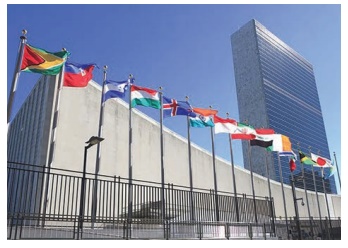
Although the League of Nations did not succeed in
its objectives, it however, ignited the dream for a universal Organisation that
would work to preserve peace in the world. With the end of the Second World War
which witnessed around 72 million casualties, the idea of the United Nations
was born. World leaders who had collaborated to bring the war to an end felt a
strong need for a mechanism that would ensure lasting peace and prevent future
wars. It was also felt that this was possible only through a global
Organisation where all nations would work together.
The name ‘United Nations’ was coined by the then
United States President Franklin D. Roosevelt and was first officially used in
1942 when representatives from twenty six nations signed the Declaration by
United Nations to continue to fight together against the axis powers in order to
obtain just peace.
Thus unlike the League of Nations, it began as an
alliance that came into being soon after the United States’ entry into the war
following the attack on Pearl Harbour by Japan and Germany’s declaration of war
against the United States in December 1941. In August 1944, delegates from
China, Soviet Union, United Kingdom and the United States, met in Dumbarton
Oaks to draw the basic blueprint for the new International Organisation and by
October the outline of the United Nations Charter was ready.
Four main purposes of the United Nations
·
Military security
·
Economic and social progress
·
Upholding of human rights
·
International justice.
Following the surrender of Germany in the year
1945, representatives from fifty countries met in San Francisco on June 26,
1945 and signed the Charter. With the conclusion of the Pacific war in October
24, 1945, the United Nations officially came into existence. While making the
UN Charter, the drafters faced the same issue that the League of Nations faced
which was to lay the foundation of an international organisation that would
guarantee peace.
The basic dilemma remained unchanged – how to balance
national sovereignty and international idealism? How could one draft a Charter
that would effectively deal with the fact that some countries were more equal
than others? How could one make sure that one country could not simply walk out
when it did not like the decisions of the UN, as Japan had done earlier in the
1930s. The simple solution that the drafters came up with was the veto power.
Veto power was granted to the five founding members of the UN – China, France,
Great Britain, the United States and the Soviet Union who are also known as the
Permanent Five (P-5). Although the founders of the UN were keenly aware of the
failures of the League of nations, most of its ideals constituted the core
element of the UN Charter. Most evidently, the UN Charter and the League of
Nations Covenant had promotion of international security and the peaceful
settlement of disputes as its key goals, however, the Charter included two more
elements that were also given importance.
Although it was reflected briefly in article 23 of
the League of Nations Covenant, the UN Charter included social and economic
progress into its key goals. The emphasis laid on social and economic progress
was rooted in the inter-war years. Many saw the global economic crisis of the
1920s to the 1930s as the root cause of political upheavals that led to the
rise of ultra nationalism and acts of aggression that resulted in the Second
World War. Thus the UN was created to be an active participant in world
affairs.
Structure of the United Nations
In 1945, the six major organs of the UN were (i)
the General Assembly, (ii) The Security Council, (iii) Economic and Social
Council (iv) Trusteeship Council, (v) International Court of Justice and (vi) the
Secretariat.
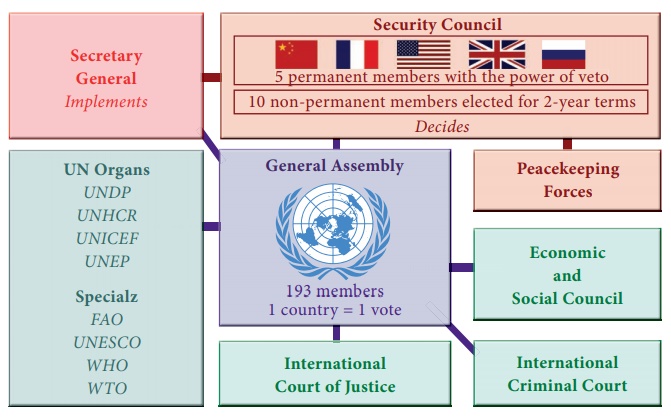
The Trusteeship Council became obsolete following
the completion of the decolonization process which it oversaw. However, these
organs constitute the basic superstructure of the UN. All organs of the UN meet
regularly and members vote to make decisions, issue declarations and discuss
issues that are of prime importance. Yet the functions of the organs differ
significantly vis-à- vis each other. While the General Assembly is the
Parliament of the UN, the Security Council is its executive committee, the
secretariat is the operational body or the bureaucracy that runs the UN.
The General Assembly
The General Assembly is the main deliberative organ
of the UN which is comprised of Member States and each one has a vote no matter
its influence or size. Discussions often include issues arising under the UN
Charter, decisions on international peace and security, admitting new member
states and the UN budget is decided by two-thirds majority. It is based on the
principle of one nation one vote. Resolutions taken by the General Assembly are
only recommendations to the member states, but since they represent the views
of majority of the world, it carries with it a heavy moral weight and often
leads countries to join international agreements called treaties, conventions,
protocols, etc., that ultimately has an impact on the world. The General
Assembly’s sessions begin in September every and most resolutions are made
between September and December. Requests for special sessions may be initiated
by the Security Council or if a majority of its members make a request. At the
beginning of each regular session, the General Assembly has a two-week general
debate in which heads of State present their views on a wide range of issues
such as terrorism, war, poverty, hunger and disease. The work of the General
Assembly is carried out by six committees:
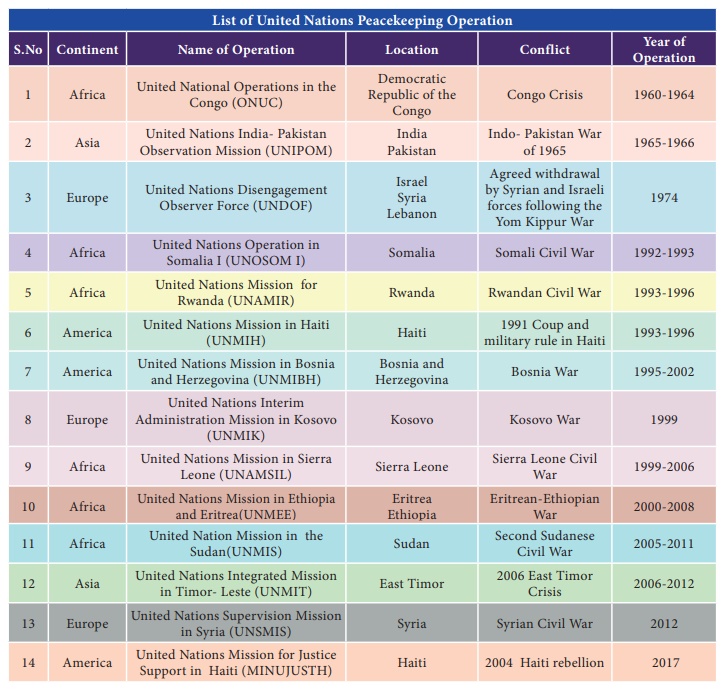
India’ Aspirations to Become a Permanent Member of UNSC:
Indian strategic interest in the
Council seat has also been shaped by its history of interacting with the
Security Council. In the early years of its independence during its armed
conflict with Pakistan on Kashmir, India paid the price for being “idealistic” to
take the Kashmir issue to the UN wherein it had to battle hard realpolitik of
Cold war years leading to UN interventions over the Kashmir dispute. TO prevent
this negative outcome ever again, the Indian presence at the Security Council,
it is hoped will ensure Indian interests are not sacrificed at the altar of
great power politics. Most importantly, it will stall any possible intervention
by China, a permanent member at the behest of its ally Pakistan.
Indian interests in the Security
Council also flow from the larger, many foreign policy debates in India on
whether it will be a status quo power that accepts liberal norms and positions
itself as a “responsible stakeholder’ in the international system or a
revisionist power that seeks to redefine the norms of international engagement.
Many pundits agree that India would be moderately revisionist that seeks to adjust
international norms and frameworks that suits its global vision, without
seeking to overthrow the current international system.
India has always seen itself as a
champion, a ‘moralistic force’ of the so called Third World, the developing
states. Former Secretary General Kofi Annan has been quoted as saying that
India has been one of the most significant votaries of shaping the UN agenda on
behalf of the developing world. At his speech in New Delhi, Annan stated:
“Indians have better understood than many other peoples that the goals of the
‘larger freedom’ that which include development, security and human rights are
not alternatives. They have been single-mindedly pursuing larger freedom
through pluralist democracy.”
Criticism of Veto Power in UNSC
The veto power has been criticized
for its undemocratic nature. A single country can prevent a majority of the
Security Council from taking any action. For example, the United States
routinely casts lone vetoes of resolutions criticizing Israel. The permanent
members also veto resolutions that criticize their own actions. In 2014, Russia
vetoed a resolution condemning its annexation of Crimea. Amnesty International
claimed that the five permanent members had used their veto to “promote their
political self interest or geopolitical interest above the interest of
protecting civilians.”
Some critics see the fact that veto power
exclusive to the permanent five as being anachronistic, unjust, or
counterproductive. Peter Nadin writes that “The veto is an anachronism. In the
twenty-first century, the veto has come to be almost universally seen as a
disproportionate power and an impediment to credible international action to crises.”
The “enormous influence of the veto power” has been cited as a cause of the
UN’s ineffectiveness in preventing and responding to genocide, violence, and
human rights violations. Various countries outside the P5, such as the
Non-Aligned Movement and African Union have proposed limitations on the veto power.
Reform of the veto power is often included in proposals for reforming the
Security Council.
It has been argued that with the
adoption of the “Uniting for Peace” resolution by the General Assembly, and
given the interpretations of the Assembly’s powers that became customary
international law as a result, that the Security Council “power of veto”
problem could be surmounted. By adopting A/RES/377 A, on 3 November 1950, over
two-thirds of UN Member states declared that, according to the UN Charter, the
permanent members of the UNSC cannot and should not prevent the UNGA from
taking any and all action necessary to restore international peace and
security, in cases where the UNSC has failed to exercise its “primary
responsibility” for maintaining peace. Such an interpretation sees the UNGA as
being awarded “final responsibility”—rather than “secondary responsibility”—
for matters of international peace and security, by the UN Charter. Various
official and semi-official UN reports make explicit reference to the Uniting
for Peace resolution as providing a mechanism for the UNGA to overrule any UNSC
vetoes; thus rendering them little more than delays in UN action, should
two-thirds of the Assembly subsequently agree that action is necessary.
Six Main Committees of the General Assembly
Disarmament and International Security Committee
Economic and Financial Committee
Social, Humanitarian
and Cultural Committee
Special Political and Decolonization Committee
Administrative and Budgetary Committee
Legal Committee.
The Security Council
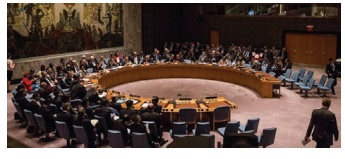
Under the UN Charter the Security Council has the
responsibility to maintain international peace and security. Unlike the General
Assembly which has regular meetings, the Security Council does not have such
meetings and can be convened at any time whenever there is a threat to international
peace. Member States are obligated to carry out the decision of the Security
Council which are legally binding. When a threat to peace is brought to the
Council, it generally asks the conflicting parties to reach an agreement by
peaceful means and if fighting breaks out, the council tries to secure a
ceasefire through negotiations, economic sanctions or by authorizing the use of
force which will be carried out by a willing member of the UN.
The Council would also decide on peacekeeping
operations to build lasting peace. The Security Council has fifteen members
which includes five permanent members (P-5). The other ten members are elected
by the General Assembly on rotation basis for a period of two years. In order to
pass a resolution in the Security Council nine out of fifteen votes is
required. However, if any one of the P-5 Members votes ‘No’, often referred as
Veto, the resolution does not pass. There are at present, proposals to include
more permanent members into the Council and these proposals are under
discussion by the Member States of the UN.
The Economic and Social Council
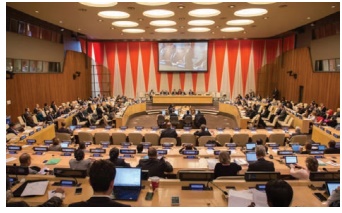
The Economic and Social Council of the UN which has
fifty-four members who are chosen for equal geographical representation and
serve a three-year term is the central body of the UN for coordinating the
economic and social work of the UN and the UN system. Over seventy percent of
the UN System is devoted to promoting higher standards of living, alleviating
poverty through full employment; economic and social progress; and development.
It promotes, economic growth in developing countries, supports human rights,
and fosters world cooperation to alleviate poverty and under-development. In
order to address specific needs of the council, it has established a number of
specialized agencies such as the Food and Agriculture Organisation (FAO), The
World Health Organisation (WHO), the UN Educational, Scientific and Cultural
Organisation (UNESCO), UN Development Programme (UNDP), UN Children’s Fund
(UNICEF), and the UN High Commissioner for Refugees (UNHCR).
The Trusteeship Council
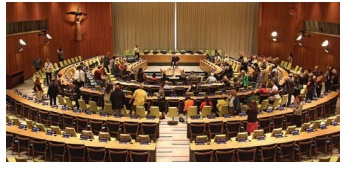
Under the UN Charter, the Trusteeship Council was
assigned to monitor the administration of eleven Trust Territories – former
colonies. At the end of the Second World War, this system was created for the
advancement of the inhabitants of those dependant territories for their
progressive development towards self-governance or independence.
Eleven Trust Territories and more than seventy
colonial territories achieved independence with the help of the United Nations.
In 1994, Palau became the last Trust Territory to become independent and
subsequently the council decided to suspend operations and meet when occasion
might require. China, France, United Kingdom, the Russian Federation and the
United States who are permanent members of the UN Security Council comprise the
Trusteeship Council. All Members of the Council have one vote and decisions are
made by a simple majority. Since the process of decolonisation has been
completed the Trusteeship Council is no longer relevant in present scenario.
The International Court of Justice
The UN’s main judicial organ is the International
Court of Justice (ICJ) and is located in The Hague, Netherlands. The ICJ or
World Court was established in 1945 and began it functions in 1946. It’s
predecessor was the Permanent Court of Arbitration (PCA). The Court settles
disputes between nations and does not take up individual cases according to international
law. Unless required by special treaty provisions, a country does not need to take
part in a proceeding if it does not wish to. If any country accepts the
jurisdiction of the court, then it must comply with its decisions.
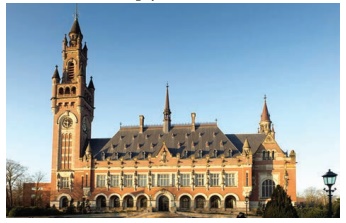
Since 1946, the ICJ has examined over 150 cases and issued numerous judgements pertaining to economic rights, environmental protection, rights of passage, the non-use of force, non-interference in the internal affairs of states, diplomatic relations, hostage-taking, the right of asylum and nationality. The court is presided by fifteen judges elected for nine year terms, each belonging to a different nation. The judges are selected by both the General Assembly and the Security Council. The court and its offices occupy the ‘Peace Palace’ which was constructed by the Carnegie Foundation which a non-profit Organisation to serve as the headquarters of the Permanent Court of International Justice under the League of Nations. The UN makes an annual contribution to the Foundation for the use of the building. UNSC refer cases to the ICJ.
The Secretariat
The UN Secretariat administers the programs and the
policies laid out by the other principal organs of the UN. The Secretary General
heads the Secretariat and is appointed by the General Assembly on the
recommendations of the Security Council. The Secretary General is appointed for
a five-year term which is renewable. As the chief administrative officer of the
UN the Secretary General directs the work of other staff in the Organisation who
are known as international civil servants.
List of Secretary Generals
1. Trygve Lie (Norway), 1946- 1952
2. Dag Hammarskjöld (Sweden),
1953-1961
3. U Thant (Burma, now Myanmar),
1961-1971
4. Kurt Waldheim (Austria), 1972-1981
5. Javier Pérez de Cuéllar (Peru),
1982-1991
6. Boutros Boutros-Ghali (Egypt),
1992-1996;
7. Kofi Annan (Ghana), 1997-2006
8. Ban Ki-moon (Republic of Korea),
2007- 2016
9. Antonio Guterres (Portugal) 2017 –
continuing
Unlike diplomats who represent a particular
country, these international civil servants work for all 193 Member States and
take orders from the Secretary General and not from governments. The
Secretariat is headquartered at New York and has its offices at Geneva, Vienna,
Nairobi, Addis Ababa, Beirut, Santiago and Bangkok. Comprising of over 16,000
staff drawn from member states, the Secretariat administers to the day-to-day
work of the Organisation.
These duties are varied and range from peacekeeping
operations, mediating international disputes, surveying social and economic
trends to laying the groundwork for international agreements and organizing
international conferences. The role of the Secretariat which is multi-faceted
is under constant pressure from the dyad of nation-state imperatives and
universal goals.
The Secretary-General may bring to the attention of
the Security Council matters that may in his opinion disturb international
peace and security. He can also use his good offi ces to prevent conflicts or promote
peaceful settlements of disputes between nations. The Secretary General can also
act upon his own discretion to deal with humanitarian or any other problem that
might require special importance.
The UN family though is much larger, is encompassed
by fifteen agencies and several programs and bodies. Some of these
Organisations were founded during the era of the League of Nations such as the
International Labor Organisation (ILO). Many more were created since 1945 to address
and solve specific issues and problems since 1945 for which the UN was
established. This has resulted in much complexity of the UN and in the
following decades since the founding of the Organisation contribute to the
escalation of tasks that the UN had been charged to undertake. As a result, new
bodies were added on a regular basis while some were made to be temporary
bodies such as the UNHCR, they have nevertheless become permanent organs. The
UN also has a hybrid set of subsidiaries and partners and throughout its
history it has been associated with almost three thousand non-governmental
Organisations.
Envisioned in 1945 in article 77 of the UN Charter,
it states explicitly that the UN ‘may make suitable arrangements for
consultation with nongovernmental Organisations which are concerned with
matters within its competence’. This made it possible for the UN to work with
hundreds of NGOs to undertake humanitarian work in conflict zones, for example,
the UN Mission in Bosnia and Herzegovina(UNMIBH) between 1995-2002. In 2007,
thirty-two NGOs issued an open letter to the Secretary General to pressurize
Sudan’s government to permit a Joint African Union/United Nations Peacekeeping
force to enter the conflict-ridden Darfur region. In the following sections,
some of the important organs of the United Nations such as the International
Monetary Fund, the World Bank and international Organisations such as Asian
Development Bank, Amnesty International and Human Rights Watch would be
examined.
The ECOSOC under the UN mandate coordinates the
economic and social work of the UN and the UN family of Organisations. It
therefore plays a key role in fostering international cooperation for
development. While the Security Council was charged with weighty issues of
military security, the ECOSOC was left to deal with questions of economic
security. However, these were not to be taken lightly as many who were involved
in the drafting of the UN Charter considered the great economic depression
during the 1930s as the root cause for the second World War. The ECOSOC
although a relatively powerless body of the UN structure, oversees a number of
functional and regional commissions. The Commission on Human Rights monitors
the observance of human rights across the world. Other bodies focus on social
development, the status of women, environmental protection, crime prevention
and narcotic drugs. However, the ECOSOC’s mission continues to remain
amorphous. The true global economic power infact lies with the so called three
sisters (i) the World Bank
The
International Monetary Fund and
the World
Trade Organisation.
Activity -Group Discussion
New Directions For The United Nations
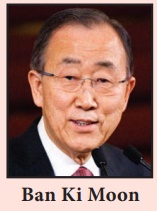
These are testing times for everyone.
People everywhere live in growing anxiety and fear. There is near – universal
loss of trust in institutions and leaders.
Amid such uncertainty, our future
depends on a United Nations that brings together the countries of the world not
only to talk and debate, but also to agree and to act; that mobilizes civil
society, business, philanthropists, and ordinary citizens to help the world
governments solve current problems; and that delivers peace, development, human
rights, global public good and hope to people around the world every day.
Courtesy : New Directions for the UN, article by
Former Secretary General of the United
Nations.
Topic for Group Discussion : How successful has
the United Nations been?
Activity
Students are asked to find the most
important cases referred to international court of justice.
Related Topics